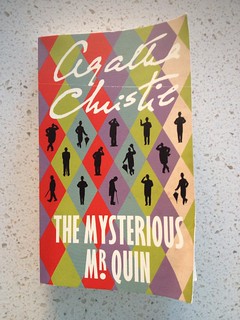TANSY:
What a bizarre collection of stories!
I’m not sure if these are terribly meta or actually paranormal – it seems to me that in these tales Christie is actually pointing out the inherent ridiculousness of the coincidences and highly mannered events of her own novels by making the coincidence factor so terribly high that it borders on magic.
Satterthwaite and his odd friendship with Mr Quinn is a hard relationship to pin down – it feels almost seductive in some stories (totally slashtastic) and in others something more innocent and playful, reminiscent of when the Doctor breaks in a new companion in Doctor Who.
Many elements in the stories feel deeply like Christie – the characters and backgrounds – but the stories themselves are so tangled up with gothic romance, ghostly prediction and a kind of magical realism that they feel also totally unlike her other work.
I’m bewildered. What does the last story even MEAN? Did Mr Quin murder the Russian dancer himself? Is he Death? If he’s Death, why does he spend so much time trying to prevent tragedies and suicides, especially those involving young lovers?
Some of the stories are quite playful and fun – the one with the opal and the Chinese box made me laugh out loud. “He’s been in prison a year!” and they remind me at times of the Isaac Asimov Black Widowers short stories in their construction. I wonder at what the effect of them would be on their own, as originally published, rather than in this whole collection.
Still bewildering, I imagine.
Also, have they made THIS one into a Poirot or Miss Marple TV movie? Because I would really love to see how the hell they could manage it.
KATHRYN:

So, like, I think this is my favorite Christie short story collection to-date. Which is not to say that I loved it and want to marry it, but it did irritate me much less than I remember previous collections (note: I am am opting to AVOID rereading earlier entries to check the veracity of my memory!!)
I totally agree that this collection had a very different, almost mystical, tone compared to Christie’s other works to date (second note: from Christie’s foreword in my copy, she refers to Quin as ‘not quite human’,and that she wrote ghost stories before she wrote crime, which suggests that the paranormal notes were intentional, and Christie did indeed write SPECULATIVE FICTION). However, I think it’s for this reason that I was happy to accept a level of melodrama and coincidence that I would have found unbelievable in a Poirot or Tommy and Tuppence story (or Miss Marple, but we haven’t technically got to her yet).
I remain bemused by Mr Quin – he seemed to be just a useful plot point in more than one story. However, I did rather love Mr Satterthwaite, and his characterisation as a gossip who knows EVERYBODY (worth knowing, of course), but who also feels he lives outside of everything as an observer. It seemed to me that his character developed over the course of the collection (intentionally or not), and perhaps it was this development that made the collection more interesting for me, compared to the others where the main players have been previously developed in novels, and therefore remain fairly static.
In the forward to my copy, Christie also suggests that the collection also describes the story of the original Harlequin, but Wikipedia tells me there are many interpretations of Harlequin so I can’t work out which one she actually means… (Third note: I did check IMDB, though, and it does not appear that this particular work has been adapted for the small or large screen!)
COMING NEXT:
The Murder at the Vicarage (1930)
The Sittaford Mystery (also Murder at Hazelmoor) (1931)